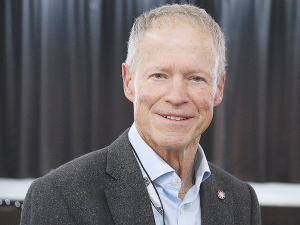Riddet Institute chair Sir Lockwood Smith says while the NZ economy is based on livestock, there is a need to ensure that we are across all aspects of the future of food.
He says if we don’t, there is a risk NZ will get left behind.
In particular, Smith says, the option of blending proteins from plants and animals is fascinating and one that should be pursued. He adds that one of the traditional problems with plant protein has been the essential amino acid balance in plant proteins. Essential amino acids are required by humans for their good nutrition.
“Blended proteins offer a way of fixing that because we get all the essential amino acids from animal proteins,” Smith explains.
He says it’s good to see Fonterra involved with the Riddet Institute, but he’d like to see the meat industry become more involved in long term research. Smith says he’s always had an ongoing interest in food science and agricultural science, back to when he was a PhD student, and is now pleased to be involved with Riddet.
According to Smith, there are all sorts of opportunities to do things better, but it’s science that will drive this.
He says there is ongoing interest in food products that can be nutritionally enhanced.
We have to aim for the higher, sophisticated value markets and to do that we need to be able to satisfy our customers,” he told Rural News. “That there is a sound scientific base for sustainability and nutritional value to what we are doing. To me, ongoing science is so important.”
Before Smith entered Parliament, he was the marketing manager at the then Dairy Board. He says he’s not disrespectful of marketing but if NZ is going to market high value products to more sophisticated consumers, we need to make sure that what we claim is underpinned by solid science.
One of the things that troubles Smith is the way the Intergovernmental Panel on Climate Change (IPCC) – which is part of the United Nations – handles carbon accounting in respect of food considerations.
He says the way the IPCC accounts for carbon efficiency is not based on the actual efficiency of food products and there are huge risks for NZ around this approach. Smith says when you get a country like NZ that exports most of the food it produces, all the carbon is accounted for in NZ.
“That makes us look like we are a high emissions country,” Smith explains.
“But the crucial issue is the carbon intensity of all food products and we have got to ensure that this is work is done carefully and scientifically,” he told Rural News.
“For example, if we were to move to more crop production in NZ, there are issues around the loss of soil carbon, but we have very high soil carbon content because of years and years of livestock grazing.”
“But I have been able to use NZ science to show that the emission intensity of our products is so much lower than similar products in Europe. We can ship products to the UK and the emissions associated with a kilogram of that product are actually lower than locally produced product in Europe – including the UK.”
Smith says that sort of science is invaluable and it has defused that debate. He believes that is why research of this kind is so important and the role the Riddet Institute and other research organisations with their international linkages and collaborations.



















